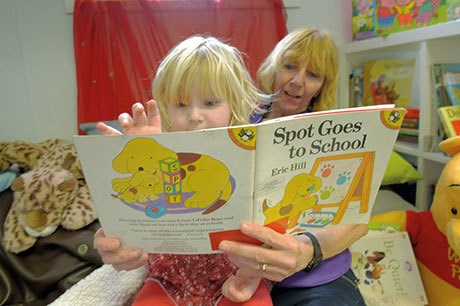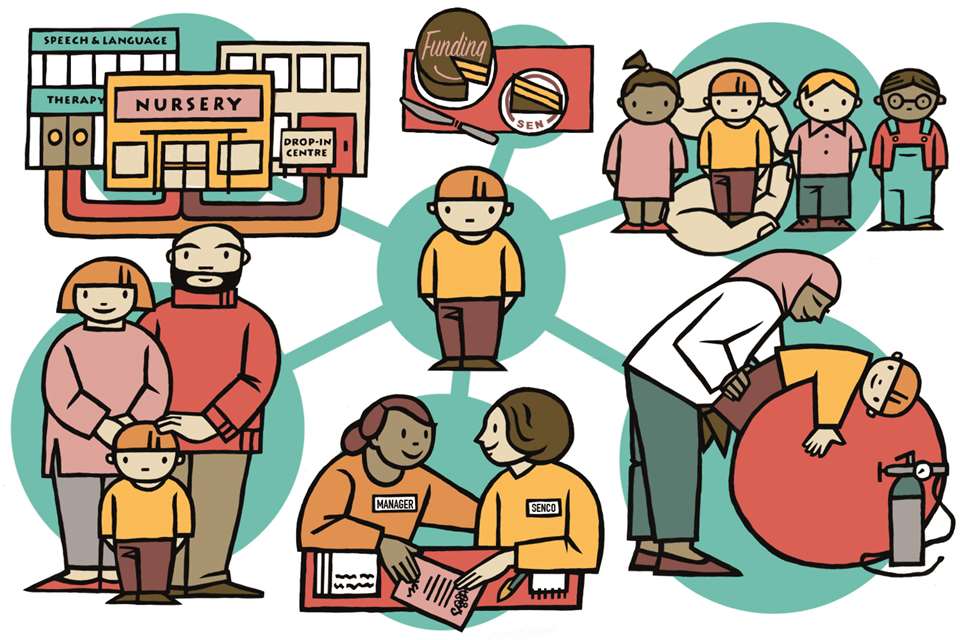Nursery Management: SEND - Plan ahead
Karen Faux
Monday, March 19, 2018
Have the Education, Health and Care plans achieved their aim of ensuring that children with SEND receive the right support from all agencies early? Karen Faux investigates

Download the PDF of this article
The right support given early enough can make a huge difference to a child’s ability to achieve. With around four in 10 children having SEND at some point during their life, a new system was introduced in 2014 to do just that. Education, Health and Care (EHC) plans, brought in as part of the Children and Families Act, are designed to be more aspirational than the statements they replace. They focus on what help the child or young person needs from everyone around them to achieve their goals. In 2016, just over 9,000 children under five had an EHC plan.
But how much has really changed? A report carried out by the Local Government and Social Care Ombudsman last October said delay in accessing assessment and funding is still the biggest source of stress and frustration for many families. Lack of local investment in early years professionals to support interventions in many areas is slowing down the process or making it simply unviable.
Experts say that the introduction of the EHC plan in an era of austerity has worked against its ambitions to move away from the clinical, impersonal statements of need with a new child-centred approach, which requires ongoing investment.
Speaking at a Westminster Education Forum event last November, Valentine Mulholland, head of policy at the National Association of Head Teachers (NAHT), said, ‘Parents who are just starting on the road of accessing support can sometimes expect to wait a year to get it. The lack of professional expertise in early years is particularly concerning, with some local authorities having no educational psychologists with experience in this area.’
She believes it will get worse when the new National Funding Formula is introduced in April. ‘Local authorities will then have to pass all of their schools block funding to schools. They will no longer be able to shift funds from it into their high-needs block to supplement early years services. I don’t think the Government understands the current crisis we have in high-needs funding.’
‘WAIT AND SEE APPROACH’
In investigating 100 complaints, the Local Government and Social Care Ombudsman estimated that only 59 per cent of new EHC plans were issued within the 20-week time limit in 2016 (see box, overleaf), and the fault lies largely with councils, which are the lead agency in the process.
In the cases it investigated, there were examples of councils not obtaining professional advice within the initial six-week time frame, and not providing professionals with clear instructions on plan applications. Sometimes councils are seeking clarification from a specialist several times, leading to delay, while others are not even aware that it is their duty to gather evidence.
Addressing these sorts of issues is at the top of the agenda for law firm Boyes Turner, which advises parents on all aspects of requesting, processing and – in some cases – appealing against the content of the plan, or the decision to refuse it. Problems frequently raised include EHC plans being vague in terms of the support required, and therapies such as speech and language being placed under the ‘health’ element instead of education because they are funded by the NHS. The local authority has no duty to provide support under the former.
Partner Laxmi Patel says, ‘Although therapies are provided by health, as far as the EHC plan is concerned, they are needed for the child’s educational support – therefore they should always be placed under the education part of the plan.’
She adds there is a way to go before local authorities can be said to be responding effectively to requests for EHC plans. ‘In my experience there is often a wait and see approach. However, where councils have carried out EHC assessments, the standard is improving because there seems to be more involvement from early years professionals, social services and portage, for example.’
MULTI-AGENCY WORKING
Most nurseries will have far less experience of applying for EHC plans than for SEND support based on the individual development plans they have drawn up in consultation with parents. At George Perkins Day Nursery in Birmingham, manager Sarah Presswood reports she has succeeded in accessing one EHC plan. ‘Usually we are told our children won’t get one as it is educational psychologists who take the lead on the plans and they don’t want to see a child until they are in their pre-school year. For a younger child it takes a lot of persistence to get these professionals to take us seriously and review a child.’
Multi-agency working is key to ensuring that EHC plans are progressed, but in the wake of cuts, nurseries are finding themselves under-resourced. ‘We are lucky that our LA area SENCO is brilliant and goes above and beyond what one would expect,’ Ms Presswood says. ‘At the same time, we struggle to access input from speech and language therapists, and communication and language is a big problem.
‘We are also struggling to get support from health visitors as the service is being changed in Birmingham, and it can be difficult finding out who to speak to. We very much need their support for children with medical needs – but when we get it, it’s brilliant. We accessed support on nasogastric tube feeding and it has helped staff become really confident.’
The impetus to secure EHC plans at pre-school stage varies between councils, according to Boyes Turner’s Ms Patel. ‘Based on what we have learnt from our clients, some councils recognise the importance of arranging support before the child starts school while others want to wait to see what the school advises once they have started.’
She adds, ‘School funding is at crisis level and in my view this has made it even more important that parents are supported to seek a plan for their child if they are likely to need additional support at school. At a time of limited resources, children with a legal entitlement via a plan are more likely to receive support than those without.’
CASE STUDY

At SEND to Learn nursery in Northumberland, which specialises in inclusive provision, founder Kath Dickinson feels the system is far from straightforward.
She says, ‘The same form is used to apply for either top-up funding, from the local inclusion fund, or for an EHC plan. The submission process is not always clear cut in relation to what other evidence is required. As we understand it, the request can be made by anyone but we have to submit the paperwork from a local Early Help meeting, where the child’s needs are discussed.
‘If you are looking at children with medical needs whose cognitive ability is age-appropriate, it is more difficult to access an EHC plan, even if that child requires daily medical procedures, constant supervision or support to access all the learning environments. We think this comes down to the issue of whether the funding comes from health or education.
‘Where the plan relates to a child who has learning difficulties and additional health needs, the process is easier as that child will already have a full multi-agency team working around them, and all team members are given the opportunity to submit a report, which is taken into consideration when the draft plans are written. But still here there can be problems when a professional is missing – such as a portage worker – involved in supporting those who have not met their developmental milestones.
‘Northumberland has been hitting the deadlines, although we have had issues where the wrong forms were sent out and the process had to be started again. Budget cuts have made the process more challenging. Northumberland is investigating changing how it allocates its top-up inclusion funding and we are hoping this could make EHC plan funding clearer.’
THE EHC PLAN: WHAT YOU NEED TO KNOW
What is an EHC plan?
It’s a legal document that describes a child or young person’s special educational, health and social care needs, the extra help that will be given to meet those needs and how that will support the child or young person to achieve what they want in their life.
What’s the timeframe to get one?
The SEND Code of Practice states that the whole process of EHC needs assessment and EHC plan development, through to it being issued, should take no longer than 20 weeks.
How do you start?
With a needs assessment. The local offer must include information about how to request one. A request is likely to happen where special educational provision being made by the early years setting, school or college from their own resources is not enabling the child to make progress.
What’s the process?
1. Submission of an EHC plan ‘parental request and information’ form, filled out with help from the setting SENCO, supported by professional information.
2. The local authority contacts the setting to find out more and look at the SEND support plan if there is one.
3. The parents should expect to hear within six weeks whether their council will be making a further assessment to progress the EHC plan.
4. Child and family will be assigned an EHC co-ordinator, who manages the assessment process and sees it through to the finish. Some councils offer an independent supporter who helps to maintain relationships between the family and practitioners.
5. The parents will be sent a draft copy and be given 15 days to comment.
6. The EHC plan will then be issued. Local authorities are also required to provide support for managing a Personal Budget, which can be used to secure some of the provision in the EHC plan, and arrangements for complaints, mediation, disagreement resolution and appeals.
Further information
Local Government & Social Care Ombudsman Report, https://www.lgo.org.uk/information-centre/news/2017/oct/a-disproportionate-burden-families-struggling-with-new-special-educational-needs-system-when-councils-get-it-wrong





